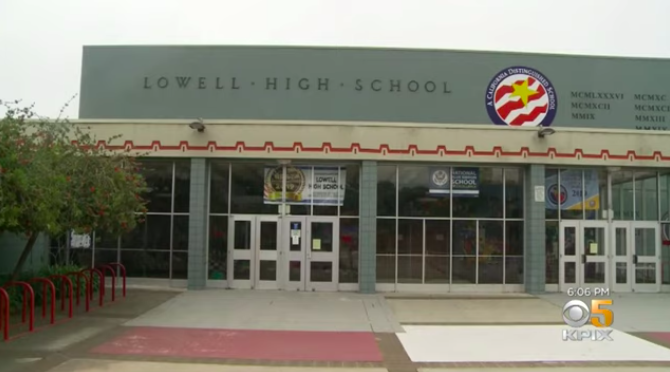
Lowell High School, San Francisco Unified School District. (Photo: youtube)
SF School Board’s Fast-Track Resolution to Eliminate Merit-Based Admission to Lowell High School
The city’s No. 1 public high school uplifts many students from disadvantaged backgrounds
By Katy Grimes, February 10, 2021 6:17 pm
San Francisco’s controversial Board of Education voted this week to end merit-based admission to Lowell High School, a top academic high school, and the city’s No. 1 public high school.
“Lowell has stood out as a beacon of academic excellence and alma mater of four Nobel laureates, a California governor and a Supreme Court Justice,” Wenyuan Wu with Californians for Equal Rights, said. “Lowell’s success to educate and lift up its students, many of whom come from disadvantaged backgrounds, has relied on a competitive, merit-based process of admissions based on standardized testing, middle school GPA, essay writing and extracurriculars.”
San Francisco Board of Education votes to END merit based admission at Lowell and permanently move the high school to the lottery system immediately.
— Kate Larsen (@KateABC7) February 10, 2021
“Commissioners Gabriela Lopez, Alison Collins, Matt Alexander, Faauuga Moliga, and Mark Sanchez voted in favor, along with two Lowell student delegates, Shavonne Hines-Foster and Kathya Correa Almanza, who helped write the resolution. Commissioners Kevine Boggess and Jenny Lam voted against the resolution,” ABC7 reported.
The replies to ABC7 Kate Larsen’s Tweet announcing the decision were almost universal in equal parts disgust and frustration.
Perhaps the most obvious reply was this: “If the school board really cared, they would improve elementary and middle schools in underserved neighborhoods before doing this, to better prepare students for Lowell. Lowell can be challenging for even the most studious student. Something will decline.”
If the school board really cared, they would improve elementary and middle schools in underserved neighborhoods before doing this to better prepare students for Lowell. Lowell can be challenging for even the most studious student. Something will decline.
— TheBalance (@needtobalance) February 10, 2021
As Wenyuan Wu said, “This politicized resolution is wrongheaded and divisive, which would in turn harm all student groups and the school’s long-standing academic track record.”
In 2019, the Globe reported a similar decision occurred with the Sacramento City Unified School District.
Parents of Sacramento’s C.K. McClatchy High School students, who had already received letters congratulating them on being accepted to the school’s rigorous academic Humanities and International Studies Program (HISP), were then called by district officials telling them that they were mistakenly notified.
The parents reported that a whole group of qualified caucasian and Asian students were removed from even being considered for the program, prior to the lottery. Parents told the Globe they were informed by district officials the HISP program was considered “too white” by the Sacramento City School District Superintendent Jorge Aguilar.
The district took the admissions process over from the high school in 2019 and now runs it from the central district office. And that’s when the troubles began. The HISP program is unique to only C.K. McClatchy High School, so many parents wonder why the district took it over after decades of the successful running program.
A teacher weighed in on the social media thread: “Sacramento City [school district] does not support the programs it has, therefore will not expand them or fully fund them. Their concept of equity is that nobody should get anything.”
Another said, “The motto of this district should be ‘if it isn’t broken we’ll break it.’ Parents need to hold the board, the superintendent and McClatchy administration responsible for that mess.”
Wu added: “California’s public K-8 education is plagued by persistent achievement gaps, even after socioeconomic factors are controlled. Progressive and woke San Francisco sticks out as the state’s worst county for black student achievement, with nine out of 10 failing state math and reading exams. This abysmal situation has deep roots in housing instability, community breakdown, high rate of turnover among teachers, and a toxic cultural de-emphasis on achievement. To blame this long-standing problem on amorphous systemic racism covers up real challenges that require practical policy solutions to bolster standards.”
Remember, this is the same the San Francisco School Board which voted in January 6 to 1 to rename 44 schools around the city over “racist” namesakes, of historical figures in U.S. history from George Washington to Abraham Lincoln to Paul Revere to U.S. Senator Dianne Feinstein, the Globe reported. The school board claimed the change was needed due to calls from a small minority of people in the city who believed the namesakes were “slave owners, had a part in slavery and genocide, were part of human rights violations, or were known racists or white supremacists.”
San Francisco School Board President Gabriela López, 30, is the one who commented, [Abraham] “Lincoln is not someone that I typically tend to admire or see as a hero, because of these specific instances where he has contributed to the pain of the decimation of people—that’s not something that I want to ignore. It’s something that I’m learning about and that I know it’s not often spoken about.”
California has a history of running afoul of discriminating against students of no color and Asians. “UC administrators essentially told them they already had ‘too many such people, who were ‘overrepresented,’” the Globe reported. “Excluded Californians pushed back against discrimination at the ballot box. The 1996 California Civil Rights Initiative, Proposition 209, bans racial and ethnic preferences in state education, employment and contracting.”
And in 2020, Wenyuan Wu and Californians for Equal Rights pushed back once again at the ballot box against Proposition 16, which would have overturned Prop. 209, the California Civil Rights Initiative, which merely states: “The state shall not discriminate against, or grant preferential treatment to, any individual or group on the basis of race, sex, color, ethnicity, or national origin, in the operation of public employment, public education, and public contracting.”
However, the campaign to bring racial preferences back to California outspent its opposition by 16-to 1, and still lost by more than 2.3 million votes, a landslide 57%-to-43%, the Californians for Equal Rights reported after the November Election.
Attacking excellence injures all students including the intended beneficiaries, Wu said. “…this assault on merit must also be understood in the broader context of a nation-wide movement to debase academic standards. The UC system, among other prestigious colleges and universities, is permanently phasing out standardized testing in its undergraduate admissions. Selective K-12 programs in places including New York City, Boston, Northern Virginia and Maryland are pressured to adopt lottery admissions in place of rigorous academic selection. Step 1 of the United States Medical Licensing Examination is now pass/fail in an attempt to boost equity. A better solution would be to build constructive relationships among students, teachers and schools, build bridges to encourage best practices and ultimately promote success, not victimhood. Above all, equality and merit must be safeguarded as guiding principles.”







I used to volunteer with a mentoring program for San Francisco High School students called “art and film.” It was designed to train, challenge, and expand the world of those who had fallen for the love of learning. Many of the participants came from Lowell, and it was clear that that school was fostering a real critical education. Also, many of the Lowell students with whom I worked were children of immigrants – especially from Russia and Southeast Asia – and they worked hard academically. It wasn’t about grades. It was truly about education.
As a graduate of a California “gifted” program myself, I at once recognized the value of Lowell and schools like it. Gifted children if held back can be terrible at conduct and discipline for the simple reason they get bored. They need to be allowed to explore, and I felt Lowell was doing this. My criticism: it seemed too small. There was an elementary school next door to Lowell that could have allowed it to increase its capacity by 1/3.
I just think if the SFUSD didn’t offer this opportunity in the public system, then what will actually happen is given the affluence, many students will go to private schools. For the true gems – the ones who were truly educated in a gifted setting and came from disadvantaged backgrounds unable to afford an alternative – this is a travesty.
Just give the kids a doctorate at birth and be done with this farce called public education.
This board should be removed from their positions immediately and no reason given; after all they don’t believe in such things as justifications and standards, right?
When it’s all said and done I doubt very much that even these destructive leftists would be okay with having a graduate of a non-merit-based medical school and residency perform brain surgery on them.
Are the majority of residents in San Francisco without children? Are they fed up and mad enough to take action? If they let these educated idiots continue and do not take action to stop them then they will be responsible for the continued decay of one of the world’s greatest cities.